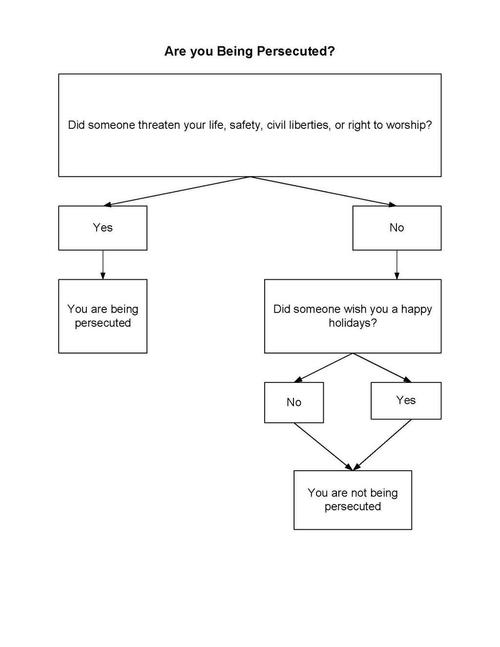
I don’t like the term “the war on Christmas” just like I don’t like the term “the war on women.” Both phrases simplistically sloganize what, I think, are legitimate and complex issues.
Interestingly enough, those statements arise from ideological adversaries:
-
Cultural / political / religious conservatives believe there’s a war on Christmas.
-
Cultural / political / religious progressives believe there’s a war on women.
In fact, the opposite is also true for both groups:
-
Cultural / political / religious conservatives DO NOT believe there’s a war on women.
-
Cultural / political / religious progressives DO NOT believe there’s a war on Christmas.
I realize these are generalizations and that the “war on anything” rhetoric is unfortunate and potentially misleading. It doesn’t represent the nuances within either group. Nevertheless, I am a religious / cultural / political conservative who, for the most part, fits within the parameters of these generalizations. Here’s where I differ: While I find the “war on Christmas” lingo unhelpful, I definitely believe Christmas, and in the broader respect Christianity, is under cultural attack. I am not offended if someone greets me with “Happy holidays” as opposed to “Merry Christmas.” In fact, I use the term “happy holidays” often myself. Now, if I was forced to say “Happy holidays” instead of “Merry Christmas,” as some employees apparently are, that’s another story. I wouldn’t go so far as say that Christians are being persecuted in America, like some “war on Christmas” proponents do. Nevertheless, I happen to believe that the mindset is in place for the progressive dismantling of religious freedoms which will eventually lead to genuine persecution of Christians in America. Which is why I don’t so easily dismiss the “war on Christmas” sentiment.
So there’s that.
Apparently, however, it is not enough to simply disagree about whether or not there actually is a “war on Christmas” or a war on Christianity. An entire industry has arisen around mocking those who dare suggest that the “war on Christmas” is part of a bigger war on Christianity. Comedians, pundits, and religious progressives have countered the “war on Christmas” with a war of their own — a war against the “war on Christmas.” Their ammunition is mostly snark, derision, and insult; their objective is to downplay conservatives’ fears, lecture us about “real persecution,” and portray “culture warriors” as the real enemy.
Ironically, those who oppose the “war on Christmas” rhetoric employ a similar rhetoric to further their own causes. Let me give you an example. Several weeks ago, this chart (below) arrived just in time for the holidays, courtesy of Rachel Held Evans. To the delight of combatants in the war against the “war on Christmas,” it made the internet rounds. This chart was linked, retweeted, and shared, often with “helpful” reminders of what “real persecution” is like and attributions of “martyr complex” upon its ideological enemies. Frankly, it was just another salvo in the war against the “war on Christmas.”
This chart was linked, retweeted, and shared, often with “helpful” reminders of what “real persecution” is like and attributions of “martyr complex” upon its ideological enemies. Frankly, it was just another salvo in the war against the “war on Christmas.”
Interestingly enough, several weeks later Evans stirred up controversy on Twitter by calling attention to the dismal number of women speakers at The Nines, an annual online church leadership conference. The subsequent jousting led to lots of queries, like that of Jonathan Merritt who asked “Are Christians conferences sexist?”
While neither Merritt or Evans used the phrase “war on women” to my knowledge, they seem to invoke the same sentiment as those who do employ said rhetoric. In other words, they believe that patriarchal, sexist, evangelical culture has oppressed women, mangled the true Church, and tainted the truth about Christ and His liberating gospel. Whether or not they believe this amounts to the “persecution” of women,” I can’t say. They would agree, I think, that something bad is in the mix.
Which I find ironic. It’s silly to complain about a “war on Christmas” but quite noble to fuss about a “war on women.”
But really, these “culture warriors” are saying the same thing:
- War on Christmas proponent: “Secular culture is progressively undermining Christian ideals, oppressing believers, and stripping them of religious freedom.”
- War on women proponent: “Evangelical culture is progressively undermining feminist ideals, oppressing women, and stripping them of personal freedom.”
The only real difference between the two is not in their conception of a “war,” but in their view of the enemy.
Listen, if you want to criticize the “war and anything” mentality, fine. Just don’t employ the same rhetoric for your causes. If there can be a “war on women” then there can also be a “war on Christmas” and/or a “war on Christianity.” All kinds of ideas, systems, and forces (secular and spiritual) can be at work to drive us away from God’s ideals — whether those ideals involve Christianity or feminism.
As I said, both of these issues carry weight. But the war against the “war on Christmas” is not the answer. In fact, it’s the perpetuation of the problem.















It’s just time for christians to bow out of the material christmas and make it a spiritual meaningful Christmas. A bit like take back the holidy. We only lost it because we returned it at the store for something expensive and wrapped nicely.
Mike, I’m concerned. This post has been up for over an hour already, and not a single irate commenter has asked whether the failure of the Target cashier to wish you Merry Christmas has resulted in your earning 68 cents on the dollar compared to what the opposite sex can expect to earn.
Hello? Is this mic on?
I am free to worship in whatever Church I choose.
I am free to have a Manger Scene displayed on my property.
My Church is free to have a Manger Scene on their property.
I am free to read my Bible at work as long as it is on my free time.
I am free to speak about my faith at work. As long as I don’t pester someone. The same as I am allowed to express a political opinion as long as I don’t pester someone. In other words, know your audience.
No one breaks down my door to find out how many Bibles I have.
No one spies on the Church meetings that I attend. I do not get calls from the police.
I don’t fear for my job because of my beliefs. I don’t fear arrest.
I’m not sure what the Culture War is really about. If we want a voice, people will disagree, we will not always get what we want. We have gotten our way for so long that we can’t distinguish between privileged and persecution.
The War On Women.
I don’t know if there is a war on women.
What I see are the same Evangelical men at the conferences.
I see that those men are primarily from churches in areas that are defined by white middle class Bible Belt suburban culture. Almost none from the Mid Atlantic states and none from New England.
These male Evangelical speakers tend to be mega church pastors, some are well established writers. The vast majority of these speakers are white.
Here’s the problem: Demographically speaking we, as a nation are changing. We are becoming more ethnically diverse. Our middle class suburbia is also changing from an economic view. We are starting to lose that middle class. From where I sit, there is a lack of female and ethnic voices in Evangelical circles. To quote Bob Dylan “The Times, They Are A Changin'”. We, as a Church are simply not adapting.
Steve, you’re actually proving my point. I eschew the “war on Christmas” rhetoric, but still believe there are trends at work to undermine Christianity in America. You eschew the “war on women” rhetoric, but still believe that there are trends at work that oppress women and/or suppress their voices. As I said in the post, “The only real difference between the two is not in [our] conception of a ‘war,’ but in [our] view of the enemy.”
Mike, the one place that we disagree is that I don’t believe that there are that many trends at work to undermine Christianity. As I stated in my comment, I believe that we have lost privileged status because we are becoming a more diverse nation. However, I am not sold on the idea that we have lost rights. We are by no means persecuted for our belief.
Understood, Steve. We disagree there. But we disagree elsewhere. I do not believe evangelical culture is as oppressive to women as you appear to. Correct me if I’m wrong. This is the point of my post. We tolerate the rhetoric of the side we agree with.
We could make a chart that goes like this
Are you being censored/silenced/persecuted by publishers and bookstore owners who are thwarting your prophetic calling?
Are you allowed to publish whatever you want?
no–>you are being censored
yes–>did a publisher ask you to cut the word “vagina” from your book?
no–>you aren’t being censored
yes–>you aren’t being censored
for fuller thoughts on this . . . I wrote a Novel Rocket post a while back:
http://www.novelrocket.com/2012/08/martyred-for-noble-cause.html
Having known a couple of published writers, I can attest that they choose their words carefully. The word “vagina” is not a vulgar word. It is the medically correct word for an organ in a human female. If I remember correctly, the publisher wanted to substitute a euphemism and less accurate “down there” in place for the correct term. To be censored IS to have your words changed to change the meaning of your work. Ms. vans’ work was not obscene, nor was it prurient. It was intended to communicate a concept, hence the specific word choice. “Down there” could be almost anyplace. Since she was talking about a purity oath, “vagina” was more accurate.
The real reasons she mentioned it I bet was that it disguised and distracted from how silly and banal The Year of Living Biblically was and made her a hero while giving free publicity. Adding vagina to the book would have done nothing to change its many faults, and most of RHE’s output is similar. Cries of censorship are one of the ways a weak work gets publicity and its faults ignored, because who doesn’t root for a put-upon underdog?
I agree with your point Mike. It seems to be “You can’t have a war but we can! You can’t do this but we can!” and it gets old. Starting to think these days it’s just as well not to play the game.